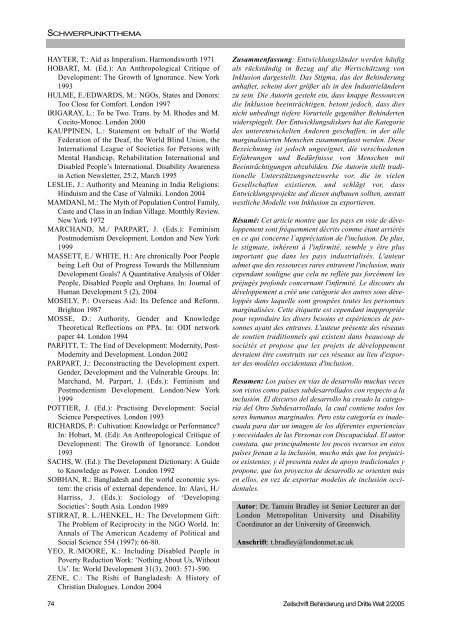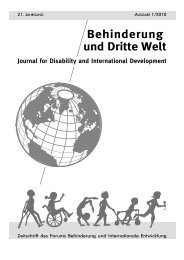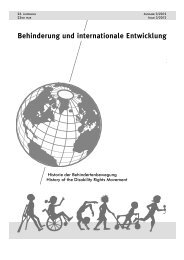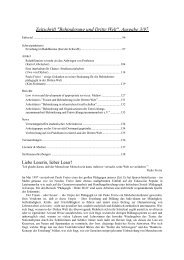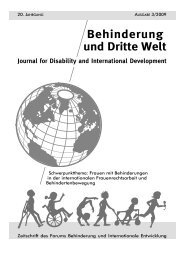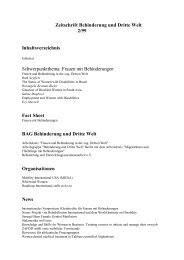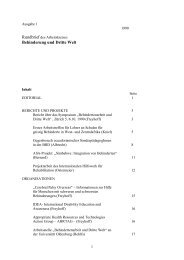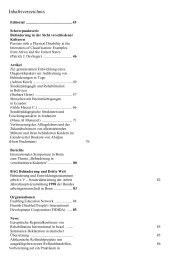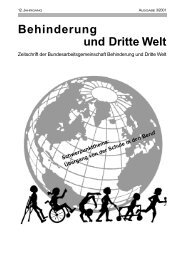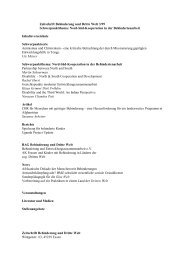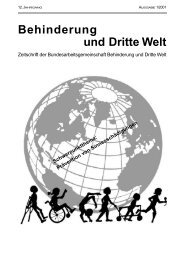Armut und Behinderung - Behinderung und Dritte Welt
Armut und Behinderung - Behinderung und Dritte Welt
Armut und Behinderung - Behinderung und Dritte Welt
Create successful ePaper yourself
Turn your PDF publications into a flip-book with our unique Google optimized e-Paper software.
SCHWERPUNKTTHEMAHAYTER, T.: Aid as Imperalism. Harmondsworth 1971HOBART, M. (Ed.): An Anthropological Critique ofDevelopment: The Growth of Ignorance. New York1993HULME, E./EDWARDS, M.: NGOs, States and Donors:Too Close for Comfort. London 1997IRIGARAY, L.: To be Two. Trans. by M. Rhodes and M.Cocito-Monoc. London 2000KAUPPINEN, L.: Statement on behalf of the WorldFederation of the Deaf, the World Blind Union, theInternational League of Societies for Persons withMental Handicap, Rehabilitation International andDisabled People’s International. Disability Awarenessin Action Newsletter, 25:2, March 1995LESLIE, J.: Authority and Meaning in India Religions:Hinduism and the Case of Valmiki. London 2004MAMDANI, M.: The Myth of Population Control Family,Caste and Class in an Indian Village. Monthly Review.New York 1972MARCHAND, M./ PARPART, J. (Eds.): FeminismPostmodernism Development. London and New York1999MASSETT, E./ WHITE, H.: Are chronically Poor Peoplebeing Left Out of Progress Towards the MillenniumDevelopment Goals? A Quantitative Analysis of OlderPeople, Disabled People and Orphans. In: Journal ofHuman Development 5 (2), 2004MOSELY, P.: Overseas Aid: Its Defence and Reform.Brighton 1987MOSSE, D.: Authority, Gender and KnowledgeTheoretical Reflections on PPA. In: ODI networkpaper 44. London 1994PARFITT, T.: The End of Development: Modernity, Post-Modernity and Development. London 2002PARPART, J.: Deconstructing the Development expert.Gender, Development and the Vulnerable Groups. In:Marchand, M. Parpart, J. (Eds.): Feminism andPostmodernism Development. London/New York1999POTTIER, J. (Ed.): Practising Development: SocialScience Perspectives. London 1993RICHARDS, P.: Cultivation: Knowledge or Performance?In: Hobart, M. (Ed): An Anthropological Critique ofDevelopment: The Growth of Ignorance. London1993SACHS, W. (Ed.): The Development Dictionary: A Guideto Knowledge as Power. London 1992SOBHAN, R.: Bangladesh and the world economic system:the crisis of external dependence. In: Alavi, H./Harriss, J. (Eds.): Sociology of ‘DevelopingSocieties’: South Asia. London 1989STIRRAT, R. L./HENKEL, H.: The Development Gift:The Problem of Reciprocity in the NGO World. In:Annals of The American Academy of Political andSocial Science 554 (1997): 66-80.YEO, R./MOORE, K.: Including Disabled People inPoverty Reduction Work: ‘Nothing About Us, WithoutUs’. In: World Development 31(3), 2003: 571-590.ZENE, C.: The Rishi of Bangladesh: A History ofChristian Dialogues. London 200474Zusammenfassung: Entwicklungsländer werden häufigals rückständig in Bezug auf die Wertschätzung vonInklusion dargestellt. Das Stigma, das der <strong>Behinderung</strong>anhaftet, scheint dort größer als in den Industrieländernzu sein. Die Autorin gesteht ein, dass knappe Ressourcendie Inklusion beeinträchtigen, betont jedoch, dass diesnicht unbedingt tiefere Vorurteile gegenüber Behindertenwiderspiegelt. Der Entwicklungsdiskurs hat die Kategoriedes unterentwickelten Anderen geschaffen, in der allemarginalisierten Menschen zusammenfasst werden. DieseBezeichnung ist jedoch ungeeignet, die verschiedenenErfahrungen <strong>und</strong> Bedürfnisse von Menschen mitBeeinträchtigungen abzubilden. Die Autorin stellt traditionelleUnterstützungsnetzwerke vor, die in vielenGesellschaften existieren, <strong>und</strong> schlägt vor, dassEntwicklungsprojekte auf diesen aufbauen sollten, anstattwestliche Modelle von Inklusion zu exportieren.Résumé: Cet article montre que les pays en voie de développementsont fréquemment décrits comme étant arriérésen ce qui concerne l`appréciation de l'inclusion. De plus,le stigmate, inhérent à l'infirmité, semble y être plusimportant que dans les pays industrialisés. L'auteuradmet que des ressources rares entravent l'inclusion, maiscependant souligne que cela ne reflète pas forcément lespréjugés profonds concernant l'infirmité. Le discours dudéveloppement a créé une catégorie des autres sous développésdans laquelle sont groupées toutes les personnesmarginalisées. Cette étiquette est cependant inappropriéepour reproduire les divers besoins et expériences de personnesayant des entraves. L'auteur présente des réseauxde soutien traditionnels qui existent dans beaucoup desociétés et propose que les projets de développementdevraient être construits sur ces réseaux au lieu d'exporterdes modèles occidentaux d'inclusion.Resumen: Los países en vías de desarrollo muchas vecesson vistos como países subdesarrollados con respecto a lainclusión. El discurso del desarrollo ha creado la categoríadel Otro Subdesarrollado, la cual contiene todos losseres humanos marginados. Pero esta categoría es inadecuadapara dar un imagen de los diferentes experienciasy necesidades de las Personas con Discapacidad. El autorconstata, que principalmente los pocos recursos en estospaíses frenan a la inclusión, mucho más que los prejuiciosexistentes, y él presenta redes de apoyo tradicionales ypropone, que los proyectos de desarrollo se orienten másen ellos, en vez de exportar modelos de inclusión occidentales.Autor: Dr. Tamsin Bradley ist Senior Lecturer an derLondon Metropolitan University <strong>und</strong> DisabilityCoordinator an der University of Greenwich.Anschrift: t.bradley@londonmet.ac.ukZeitschrift <strong>Behinderung</strong> <strong>und</strong> <strong>Dritte</strong> <strong>Welt</strong> 2/2005


